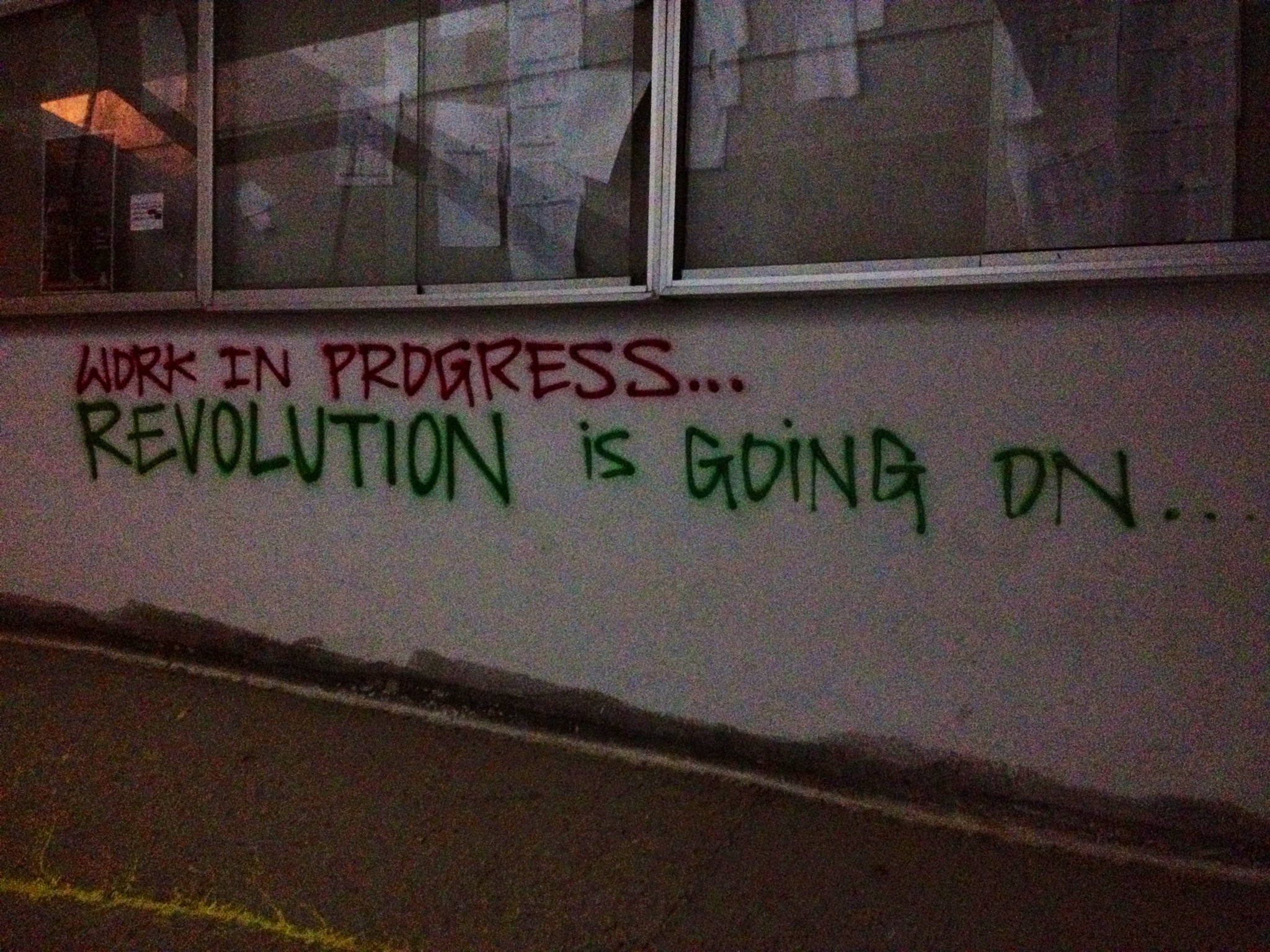By Elizabeth Jesdale, President of UE Local 255, the unionized workers at Hunger Mt Coop, member of UE General Executive Board, Steering committee member UE United Coop Workers, and member of GGJ delegation to WSF
Abbreviations: GGJ – Grassroots Global Justice Alliance; UE – United Electrical, Radio and Machine Workers of America; WSF – World Social Forum
When I was chosen to represent our Union within a delegation traveling to Tunisia, I knew my life would change.
And it did.
The 6 weeks prior to arriving in Tunisia were packed with getting ready while also trying to maintaining my duties at my job and in my union. Balancing a full-time job, meetings, phone calls, readings, learning about the region and the WSF, scheduling, some semblance of a personal life (well, that got thrown out the window to be honest) and… fundraising. I had never before participated in fundraising. As a person uncomfortable with asking for favors, let alone for money, fundraising was a huge obstacle in itself to overcome. With a combination of asking on Facebook and sitting at a table on three different days at my workplace, we were able to raise $1,500 in about a month. The donations were of two kinds, a large donation (ranging from $20-$150) from people who are union brother and sisters and allies, and the other half of the money was raised dollar by dollar from co-workers and strangers. I appreciated both types of donations immensely- the larger donation were a statement of support and trust- a ‘Hey- you can do this’ and the smaller donations a symbol of democracy- one person, one vote, how when we all come together and contribute just a little bit how much we can achieve together. The symbolism of both types of donation were carried with me on this journey whenever I opened my wallet to pay for something in Tunisia- a meal, transit, a fresh squeezed orange juice, a booklet, t-shirt.
While fundraising it was difficult to answer the frequent questions “What are you going to do there?” “What are you going to bring back?” I answered with a general description of the World Social Forum as I understood it, and then had to answer people with “To be honest, I’m not really sure of the answers, and that’s why I am going”.
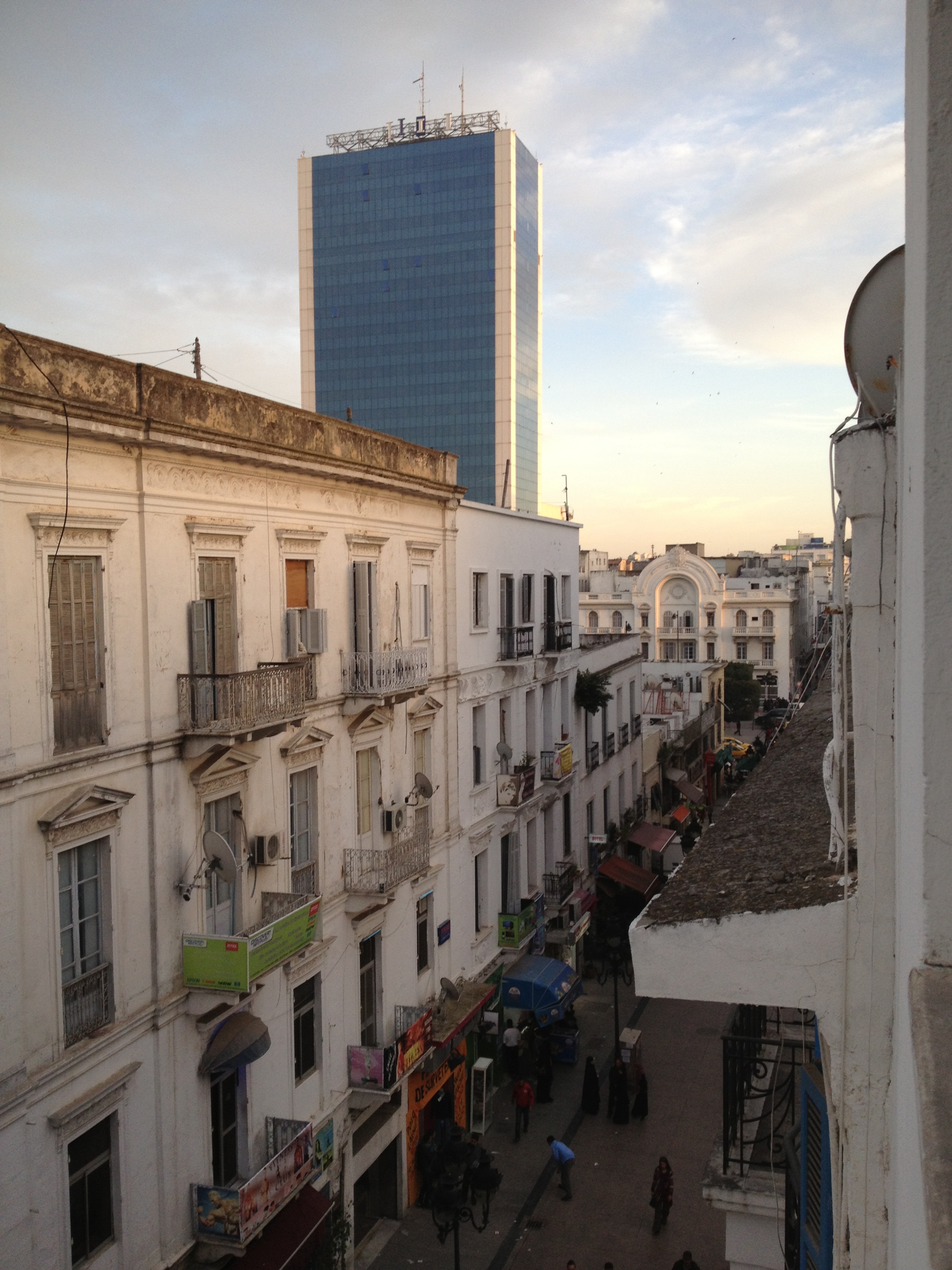 On our first night in Tunis I leaned out the hotel window, trying to soak it in, looking at the African sky, the surrounding buildings, the shops and pedestrians below, the men staring back from the windows, balconies, and rooftop across the street, thinking “I am really here, I am in Africa”. A place I never thought I would get to in this lifetime on my grocery-store salary.
On our first night in Tunis I leaned out the hotel window, trying to soak it in, looking at the African sky, the surrounding buildings, the shops and pedestrians below, the men staring back from the windows, balconies, and rooftop across the street, thinking “I am really here, I am in Africa”. A place I never thought I would get to in this lifetime on my grocery-store salary.
A few blocks from our hotel on the Rue de Marsaille in Tunis was the Plac du 7 Novembre, a traffic rotary with a large clock, a symbol of the ‘Jasmine Revolutions’ as named by the press, and the subsequent Arab Spring. The rotary and boulevard were built by the French colonizers, and so was an apt location for the birthplace of the uprisings called by the people of Tunisia the ‘Revolution of Dignity’. People took to the streets to demand the basic tenants of dignity and respect: affordable food, employment, freedom of speech and freedom from other corruptions. In the two years since the Revolution of Dignity, Tunisians still struggle for a fair election process after the sudden loss by assassination of leader & presidential candidate Chokri Belaid.
At night young boys sell small bundles of jasmine flowers wrapped in red twine and fragrant necklaces made of jasmine buds. From the view out of the top floor window of the hotel, I can see these boys selling the flowers and then occasionally returning to a man giving him the money. This man could be a father figure or possibly a boss, I don’t know. I found it troubling, thinking of a friend’s son who is about the same age, safely tucked in bed at night; it made my gut feel off. Many times over the week there I was in situations where I had the same off-putting feeling without necessarily knowing why. The young boys selling jasmine flowers are a reminder to me of people’s ability, out of necessity, to create an alternative economy and our will to survive. And also that I am immersed in a culture I do not understand.
On the first day I went with my travel mate and fellow union sister, Autumn Martinez (Vice President of our UE local, fellow activist & GGJ delegate member), to the Medina to shop. The Medina is currently a UNESCO world heritage site with origins dating back to the 8th century. It is a well know shopping place, with little shops crammed with goods and aggressive shopkeepers. We went on a Sunday, most shops were closed. This was fine by me, as it was overwhelming enough as it was. As we walked through the alleys shop keepers were calling out, following us, trying to get us to come back to their shop. Autumn got into several negotiations sessions while I watched; smiling to myself and admiring her pluck as I frequently do. We naturally fell in good cop/bad cop roles. Did these guys know they are dealing with some master negotiators? And we were dealing with some too.
We were by the central mosque in the Medina, and a man offered (well, insisted, really) to show us up to the rooftop of a castle. We followed him thought the twisty turns and covered alleys. At one point my heart stopped a bit as there was no one around, and knowing ‘nothings free’ and something would be expected of us at some point but not knowing what that would be. I took a deep breath and decided to trust the moment. This happened over and over during the time in Tunis. Knowing I could possibly be in over my head, but relying on instinct (I did have a compass among other things in my bag…) and faith in the basic decency of most people to be able get out of sticky situations if I needed to. Finally he came to a staircase and it wound up to a rooftop with a view of the whole city. We stood for several minutes silently and taking it all in. Of course on the way down he brought us to his brothers perfume shop….nothings free….
On our way back out of the Medina I thought I had found a public restroom. I won’t go in to great detail on the bathrooms, but suffice to say finding a bathroom while traveling in a strange land is always a boon. I stepped inside and was confused by the tiled room with a row of hoses. I had heard the restrooms in Tunisia were different so I stood trying to figure it out. Much to my embarrassment, and man came running in and made urgent gestures that I needed to leave. I stepped out and we realized I had gone into the entryway to a mosque. This was one of many errors I made during the week that I regretted, not intending to be disrespectful. I made errors due to being tired and out of my comfort zone, by a combination of lack of familiar food, sleep, language barriers, unfamiliarity with social cultures and plain old ignorance and making assumptions. One of many lessons I learned during the week was to try and be patient with myself about making these mistakes, and to try to not regret them, as the time there was short and Tunisia is so far away I didn’t know if I would ever be able to return and wanted to leave intact.
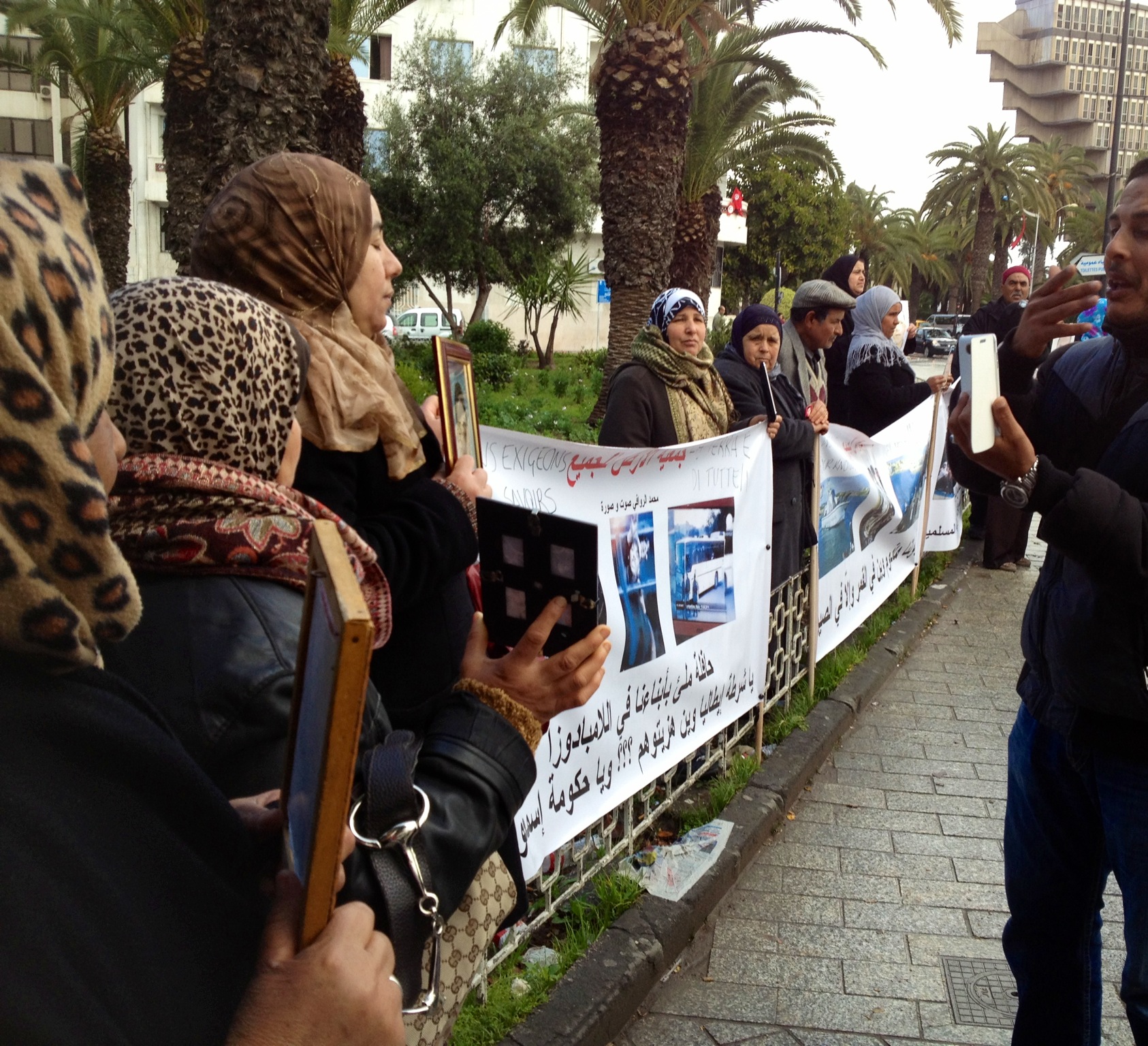 On our second day a group of us went to the tourism office near the rotary at the Plac de 7 Novembre to attempt to obtain maps of Tunis for our delegation. On our return we came across a group of women holding banners and pictures of men’s faces. It was my first encounter with this soon to become familiar and haunting sight of mothers and wives (or widows) holding photographs of husbands and sons who are lost or missing. Though we couldn’t read the signs in Arabic, it was clear these women carried a pain no one should have to bear. The banner had photographs of a boat. From what I could understand these were the mothers and wives of men lost on a particular attempt at migration. Many people are lost at sea when they attempt to migrate to Europe on overloaded unsafe boats and even rafts in an attempt to find work. Unemployment in many part of the African continent has swollen to 40% forcing people to put their lives in peril in an attempt to survive financially with hopes of piecing a life of dignity back together. These families will never have that chance.
On our second day a group of us went to the tourism office near the rotary at the Plac de 7 Novembre to attempt to obtain maps of Tunis for our delegation. On our return we came across a group of women holding banners and pictures of men’s faces. It was my first encounter with this soon to become familiar and haunting sight of mothers and wives (or widows) holding photographs of husbands and sons who are lost or missing. Though we couldn’t read the signs in Arabic, it was clear these women carried a pain no one should have to bear. The banner had photographs of a boat. From what I could understand these were the mothers and wives of men lost on a particular attempt at migration. Many people are lost at sea when they attempt to migrate to Europe on overloaded unsafe boats and even rafts in an attempt to find work. Unemployment in many part of the African continent has swollen to 40% forcing people to put their lives in peril in an attempt to survive financially with hopes of piecing a life of dignity back together. These families will never have that chance.
The unemployment rate, a consequence of the ravages of capitalism, has caused the pressure to migrate for work leading to families being broken apart and lives of these men to be inexcusable lost. Daily I saw women bravely holding haunting images of loved ones faces carrying their pain publicly in hopes of changing the system and that they will not be forgotten. We must change this crippling system.
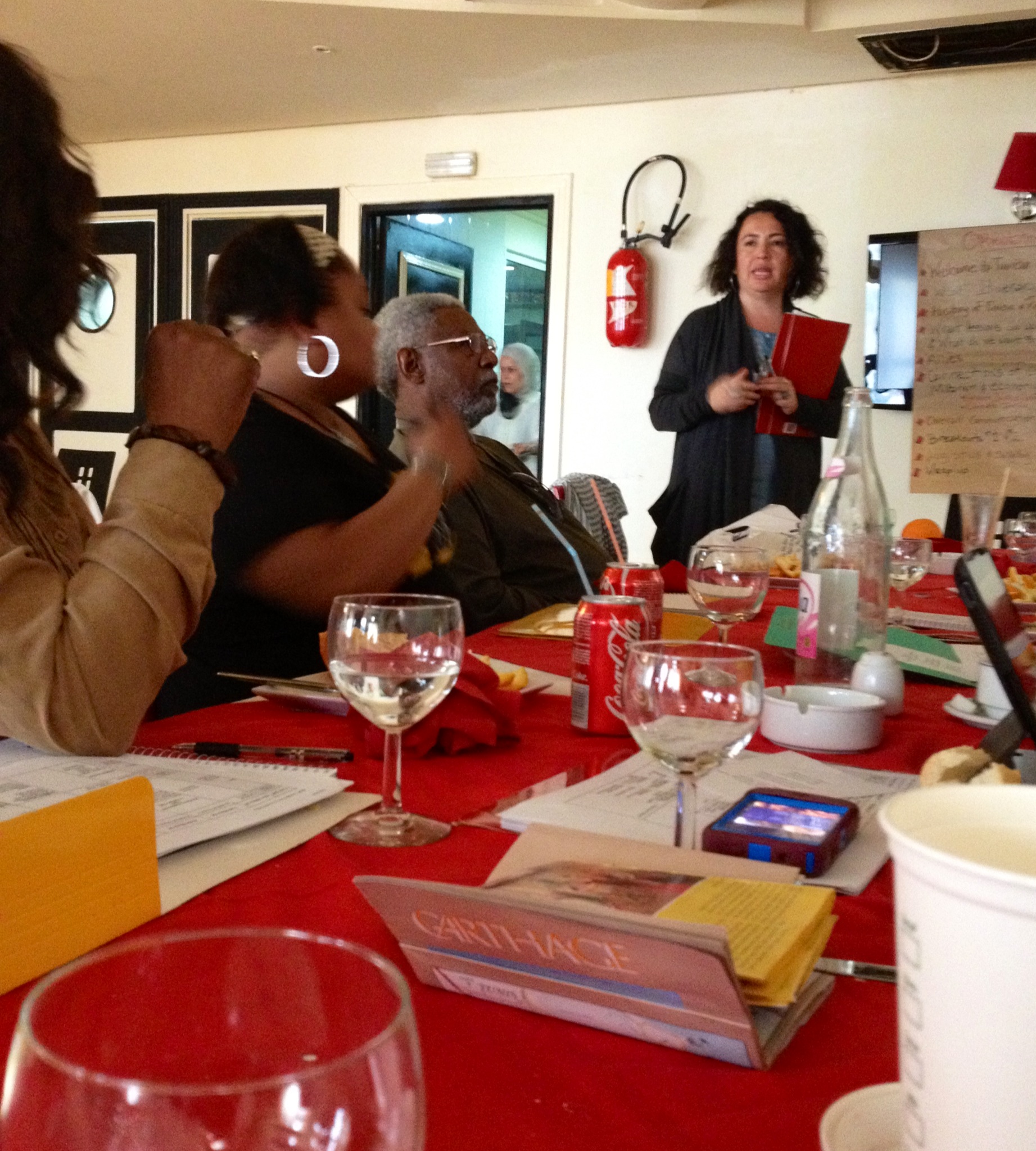 Our delegation met together on Monday for the first time and I sat with the group, knowing some of these strangers would become friends and allies and some of our work would continue to overlap, draw strength and knowledge from each other for many years to come. It was so inspiring to consider this looking around the table at these wonderful people. It was (and still is) deeply humbling to have been chosen to be a part of this special group encompassing representatives from a variety of grassroots organizations from across the United States. I knew if this same group were to get together in the United Sates for a week we would still leave wanting more time together, with unanswered questions and many conversations unfinished. What on earth would it be like getting to know this group over here, on the African continent, at an event filled with over 1000 workshops and 50,000 plus people expected to attend, without the luxury of cell phones to communicate and make plans together?
Our delegation met together on Monday for the first time and I sat with the group, knowing some of these strangers would become friends and allies and some of our work would continue to overlap, draw strength and knowledge from each other for many years to come. It was so inspiring to consider this looking around the table at these wonderful people. It was (and still is) deeply humbling to have been chosen to be a part of this special group encompassing representatives from a variety of grassroots organizations from across the United States. I knew if this same group were to get together in the United Sates for a week we would still leave wanting more time together, with unanswered questions and many conversations unfinished. What on earth would it be like getting to know this group over here, on the African continent, at an event filled with over 1000 workshops and 50,000 plus people expected to attend, without the luxury of cell phones to communicate and make plans together?
It was like nothing I have ever experienced.
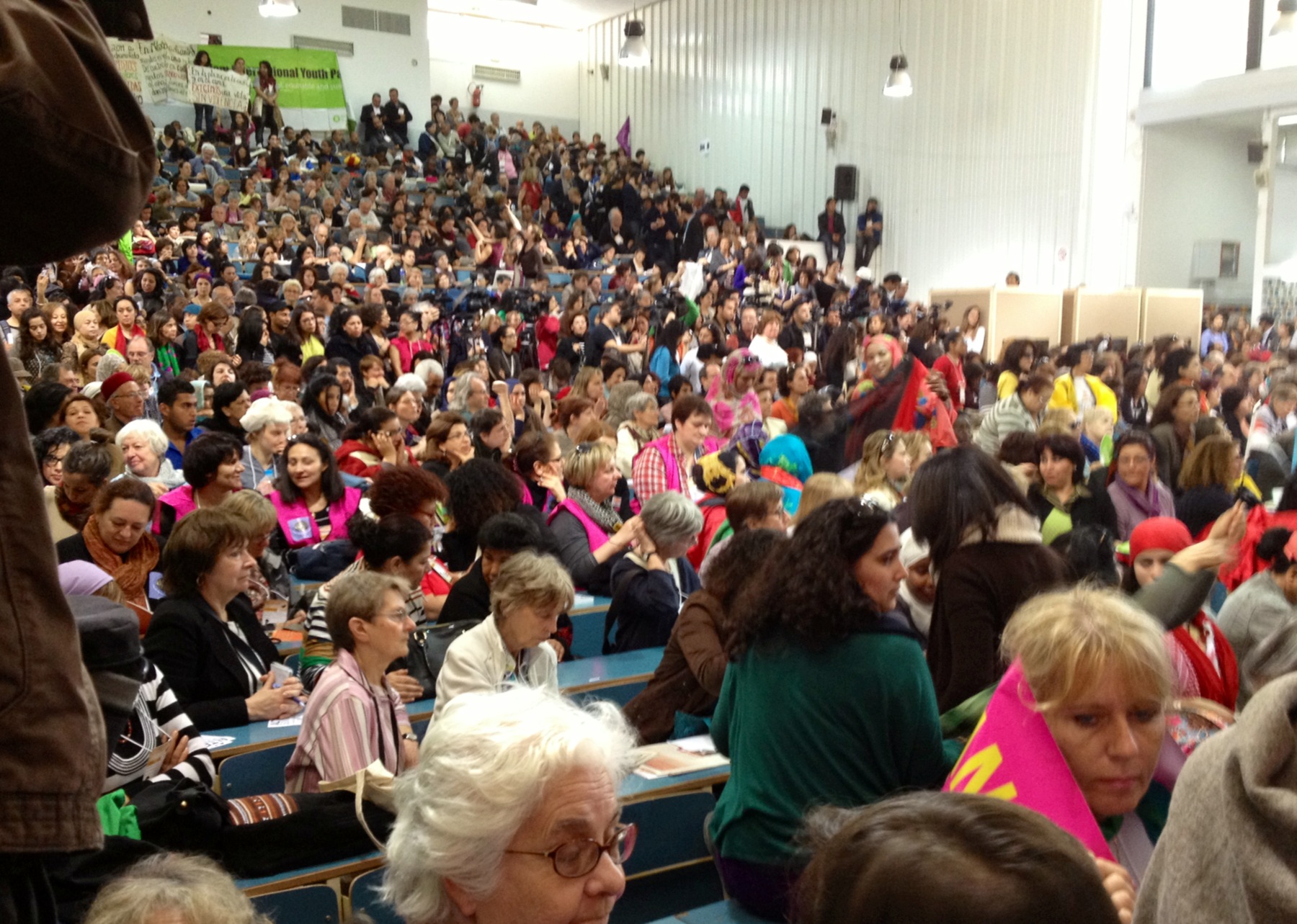 The next day we went to the Women’s Forum, held in a huge auditorium on the university campus that hosted the WSF. The room was packed, people spilled out of the doorways trying to listen. Our group was focusing on getting our translation equipment up and running, and on finding a spot where we could listen together. Thought this may sound simple enough, it was a precursor of how things would be for the week to come- the room was filled with over 1000 people, cheering, chanting in different languages and pushing to get to a spot where they could see. We didn’t have a way to communicate and find each other once we were pressed in from all sides. One woman after another came to the stage and spoke. Even though our equipment wasn’t up and running yet, the excitement was palpable and easily reached across language barriers. When I made eye contact with the other women we exchanged knowing smiles- an understanding of being a woman in this world and how great it felt to be together in support. Pure magic.
The next day we went to the Women’s Forum, held in a huge auditorium on the university campus that hosted the WSF. The room was packed, people spilled out of the doorways trying to listen. Our group was focusing on getting our translation equipment up and running, and on finding a spot where we could listen together. Thought this may sound simple enough, it was a precursor of how things would be for the week to come- the room was filled with over 1000 people, cheering, chanting in different languages and pushing to get to a spot where they could see. We didn’t have a way to communicate and find each other once we were pressed in from all sides. One woman after another came to the stage and spoke. Even though our equipment wasn’t up and running yet, the excitement was palpable and easily reached across language barriers. When I made eye contact with the other women we exchanged knowing smiles- an understanding of being a woman in this world and how great it felt to be together in support. Pure magic.
There were over 1000 workshop held over the week and Autumn and I were to be panelists in one titled ‘The struggles of women unionist and building solidarity from North to South’. We knew we were to meet a man named Christian, a union representative from France. We tried to contact him without success and figured we would just show up at the workshop and jump in. The afternoon before the workshop was to be held we were participating in a march with over 10,000 people, chanting and waving signs a flag, exchanging buttons, stickers, cards and handshakes with people from around the world and many Tunisian youth. I heard someone calling my name, and there was a man I had never seen before. He said his name was Christian. He found us in the throng! This seemed impossible at the time, but this became the norm over the week, people popping in and out, some to never see again, some to become close friends and allies from back home and from Tunisia, France, Spain, Egypt, Palestine to name a few.
We made plans to meet the next morning and go to the campus together for our workshop. On the ride there Christian explained how in France the owners of the factories felt more beholden to the stockholders, and would rather close a factory down and sell it to make profit than stay open and provide decent jobs and a livelihood for the communities they were located in France. Or they would close down and reopen in Tunisia, where the regulations are weaker, and they pay lower wages. Owners claim that after the revolution they will not respect the law ‘There is no law here, so I am going to make my own’. This is an example of commerce and capital moving freely across borders where people are not allowed the same freedom.
We arrived at the workshop site and got settled in. There was no translation equipment so we spent the first 15 or so minutes figuring out the minimum number of languages we could translate into and who would do the translating. There were about 50 people in the room from many countries, members of the audience stepped up and participated to make sure all in the room could understand what was being said by those of us on the panel and that all able to participate in the discussion portion of the workshop. This happened relatively easily with no clear leader or the group, people spoke up for their needs and were heard, people checked in to make sure everyone felt like they were participating. People took turns and were patient with one another. It was clear the unspoken intention was that everyone wanted everyone else to be included. To me this one was on the most beautiful things that happened during the WSF and it struck me that if a group of strangers from around the world can figure out for themselves how to communicate and make sure all voices are heard, then why can’t our governments? It comes down to intention.
On the panel we described what our union was like, and our participation in it. How our union is democratically run and actively encourages the growth and education of women and those from a variety of backgrounds and education levels. All in the UE are valued for their ability to contribute a variety of viewpoints. We spoke about our unions connections with workers across borders and how we had the same struggles with jobs moving from the United States to other countries, devastating communities and workers access to jobs and income here in the United States as the companies provide low wage jobs elsewhere only in the effort to increase their own profits at all costs. We spoke about the efforts of our union to connect with other independent unions to put pressures on government and businesses for better wages and working conditions at these jobs. As a result of being at the WSF our union now has connections not only to the south and north of us on the American continent, but now to the east and south east as well.
At the end of the workshop one of the participants, Sonia, motioned me over and through drawings, hand signals and some translation invited me to come to a rally in front of the French Embassy that was to be held two days later. I agreed and she drew me a map.
The factory where Sonia works is owned by a French company that moved the factory from France to Tunisia. They are a unionized shop, and they pushed for months to get management to the table to negotiate wages. During these negotiations they were able to almost double their wages. In response, instead of looking for ways to make further improvements, the management closed the factory down, putting 400 people out of work. A week later, they put up a sign on the factory gate stating they would be reopening and any worker who wanted to come back would come back at the original low wages. Many of the workers returned, from the necessity of needing a job due to the high unemployment rate and a lack of other places to work.
Sonia was suspended for speaking up about how wrong this was. The workers all went on strike in solidarity with her being wrongly suspended.
The workers returned to work, and were holding this rally in front of the French Embassy in support of their right to organize and to not be retaliated against for speaking up about poor working conditions and unfair treatment.
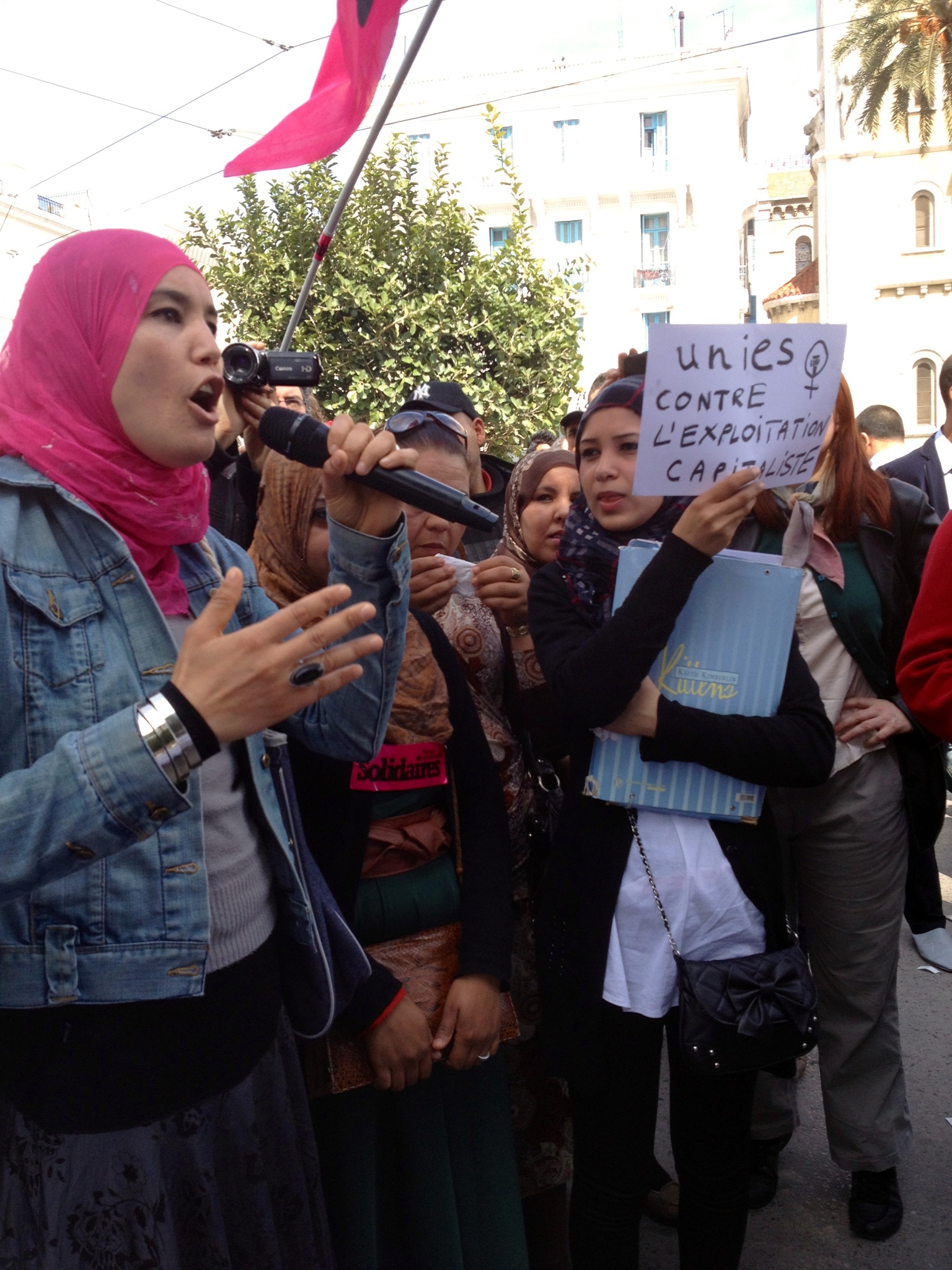 As I arrived at the rally, there were rolls of barbed wire blockading the sidewalk around the embassy. The rally took place on the street with traffic and pedestrians squeezing around. There were guards from the embassy and Tunisian police, both with large guns. The air was charged. The women and their supporters were chanting for solidarity. The workers were holding banners and signs ‘united against the exploitation of capitalism’ and ‘the workers demand laws and human rights’ and speaking into a microphone. I went through the crowd and found someone who was able to translate from English into French and we went and asked to use the microphone so I could give a message of solidarity to the group. I said “I am a union worker here from America. I am here standing in solidarity with my working sisters. Though our feet stand on soils, the blood flowing through our veins is the same as ours. Though we may have different workplaces, we stand together in the same fight against capitalism.”
As I arrived at the rally, there were rolls of barbed wire blockading the sidewalk around the embassy. The rally took place on the street with traffic and pedestrians squeezing around. There were guards from the embassy and Tunisian police, both with large guns. The air was charged. The women and their supporters were chanting for solidarity. The workers were holding banners and signs ‘united against the exploitation of capitalism’ and ‘the workers demand laws and human rights’ and speaking into a microphone. I went through the crowd and found someone who was able to translate from English into French and we went and asked to use the microphone so I could give a message of solidarity to the group. I said “I am a union worker here from America. I am here standing in solidarity with my working sisters. Though our feet stand on soils, the blood flowing through our veins is the same as ours. Though we may have different workplaces, we stand together in the same fight against capitalism.”
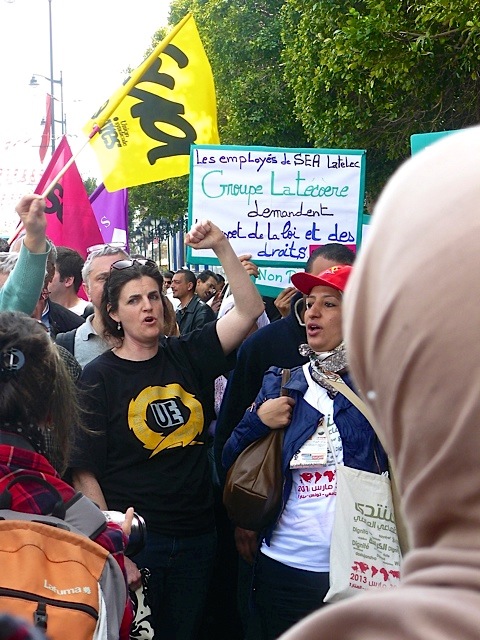 As I was speaking I realized that I was not within the relative safety of the WSF location on the campus, and that I was on the street downtown, without accompaniment, calling out that I was an American amongst a swirl of strangers and passersby. I didn’t know what possible ramifications there could be and my heart was in my throat.
As I was speaking I realized that I was not within the relative safety of the WSF location on the campus, and that I was on the street downtown, without accompaniment, calling out that I was an American amongst a swirl of strangers and passersby. I didn’t know what possible ramifications there could be and my heart was in my throat.
One of the policemen began yelling at Sonia. I could not understand what was being said, but I could see she was very upset and was responding with her voice shaking and visibly upset. I asked someone what he was saying, and he translated that the officer was insulting and degrading her. I went up and stood right next to her, looking the officer directly in the eyes, my way of letting him know that I was there in support and watching. I was worried that some harm, arrest perhaps, might come to her and I hoped my presence as a foreigner would provide witness and possibly some protection. The confrontation ended and Sonia took my hands and we led the group down the sidewalk of the main street in the city, calling out chants for solidarity, justice and support. It was a heady time and something in me shifted that I am still coming to grips with.
We parted ways, and despite my efforts, I did not see her again during my limited time left in Tunis.
Since returning home I found out that all of the women who participated in that rally were disciplined at work, ranging from harassment to being fired. Five workers were fired, including Sonia, who has now gone on hunger strike with 2 of the other workers.
I signed the petition to support these workers rights and have tried to find out more details. My emails to Sonia remain unanswered, and I can only hope that somehow she knows I am trying to find out what is happening and see what kind of support we can provide to help get her job back and improve conditions at the factory for her and her co-workers.
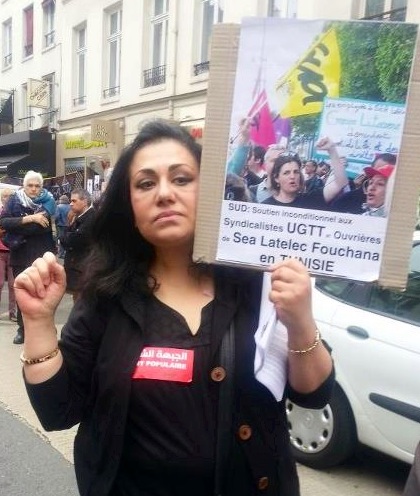 On May 1st I attended our rally at the Vermont statehouse with several of my union brothers and sisters. We walked in the march, and had many conversations on the statehouse lawn with people from other grassroots organizations, looking for ways to support each other’s work. At the end of the event, several of us went to get something to eat. Sonia and the people I met in Tunisia for around the world were very much on my mind that day, and while we were sitting on our booth I checked to see pictures of Tunisian May 1st activates, partially in hopes of seeing a photograph of Sonia in the crowds to know she was ok. I scrolled though pictures and stopped with shock. There was a picture of a woman holding a photograph of me speaking at the rally in front to the French Embassy that day in Tunis. With a caption stating I showed unconditional support for the union UGTT workers of Sea Latelec Fouchana in Tunisia. From what I can figure out the woman was marching in the rallies in Toulouse, France…. This was quite a moment for me. I realized that my being there that day had changed me as I felt there was no option but to speak up despite the risks. But to recognize and that this also held great meaning for workers across the ocean gives me a new understanding of solidarity.
On May 1st I attended our rally at the Vermont statehouse with several of my union brothers and sisters. We walked in the march, and had many conversations on the statehouse lawn with people from other grassroots organizations, looking for ways to support each other’s work. At the end of the event, several of us went to get something to eat. Sonia and the people I met in Tunisia for around the world were very much on my mind that day, and while we were sitting on our booth I checked to see pictures of Tunisian May 1st activates, partially in hopes of seeing a photograph of Sonia in the crowds to know she was ok. I scrolled though pictures and stopped with shock. There was a picture of a woman holding a photograph of me speaking at the rally in front to the French Embassy that day in Tunis. With a caption stating I showed unconditional support for the union UGTT workers of Sea Latelec Fouchana in Tunisia. From what I can figure out the woman was marching in the rallies in Toulouse, France…. This was quite a moment for me. I realized that my being there that day had changed me as I felt there was no option but to speak up despite the risks. But to recognize and that this also held great meaning for workers across the ocean gives me a new understanding of solidarity.
We all understand that an injury to one is an injury to all.
One of my goals in attending the WSF was to be able to connect with unionists from other countries, and to bring those connections back home and stay in touch with each other struggles and successes, to build deeper relationships of solidarity and inspiration. I had no idea it would take place in this way. The story of our international solidarity has begun.

